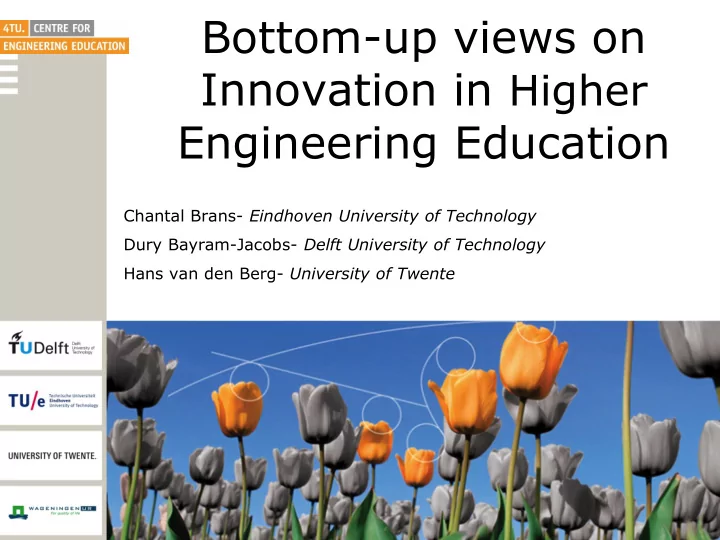

Bottom-up views on Innovation in Higher Engineering Education Chantal Brans- Eindhoven University of Technology Dury Bayram-Jacobs- Delft University of Technology Hans van den Berg- University of Twente
Program 1. Short introduction to research 2. Work on a casus 3. Discussion 4. Card sort exercise Innovation Factors 5. Discussion and wrap up
Drama
Problem Problem sharing and stimulating innovations and insights; 1. The innovations were inaccessible to other teaching faculty and management within the institutions and to interested parties in other engineering universities. 2. Too little is known about what innovations in higher engineering education (HEE) look like and what factors influence the success and sustainability of an innovation in HEE.
Research questions 1.What defines an innovation (in HEE)? 2.What constitutes a successful HEE innovation? 3.What factors influence innovations in HEE? 4.How can innovations in HEE be sustainable?
Overview of Perspectives and terminology Spreading ‘ Survival ’ Innovation Perspective Idea Sustainability Process to develop and implement an innovation Appreciation of the results Context of innovation (outcomes) process, e.g. broader organisational aspects Teaching & Process Learning
Literature Review Interviews (Educational Directors) 52 ( n TUD = 19, n Tue =15, n UT =18) Definition of Innovation + Success & failure factors, Cases Workshop-SEFI (Validation) Workshops TU/e, TU Delft, UT (Validation)
Innovation Map https://www.4tu.nl/cee/en/research-innovation/
Group Work- Cases • Read the case • Was this a successful innovation? • What would you advice the innovator?
Professor H. I got a grant to make my course more blended. I was enthusiastic and started making weblectures, quizzes and open educational resources. Now the whole course is almost fully online, so students can study anytime, anywhere. The students had a kick-off meeting at the beginning of the course and halfway there was a questions and answers meeting. The final exam of the course was at the third and last meeting of the course. In the evaluation of the course, I was burned down to the ground. All the students hated the course. They didn’t like not to see me as the teacher. That was something I didn’t expect before, because students always say they want to be more independent. I thought they could be more flexible and would like it when they can do it whenever they have time… but apparently they did not like that at all. I redesigned the course with more meetings planned with the students.
Professor G. I was often surprised (not in a good way) when I was correcting the final papers of students. I noticed that students, who seemed to do very good during the lectures and seminars, handed in terrible end reports for my course. I assumed this might be related to the fact that some students had trouble writing down the knowledge and expertise, rather than the fact that they didn’t understand the subject matter. Thus, I experimented with movies as end reports. Students had to make a movie in which they explained the matter of my course. The movies were of better quality than the end reports I usually got. Next to that, I had a great time watching all the students’ movies, my work thus became more fun!
Professor B. In our University, we wanted to design a new educational track. This track was meant to integrate two disciplines: Civil Engineering of the Building Department and Industrial Design Engineering of the Design department. The aim of this new track was to enhance pre-fabricated construction units, by increasing it’s efficiency, worker safety, and decreasing the power of architects. The professional field supports this innovation. We appointed an outside coordinator to the project. This coordinator was an architect. When we started the new track after a few months of thorough preparation with a select group of students, the students were pampered by the teachers. However, after a short period of time, the students started to behave very presumptuous and they created a new discipline, instead of the integrated discipline we aimed for.
Definition Innovation “ an idea, practice, or object that is perceived as new by an individual or another unit of adoption” (Rogers, 1995, p. xvii). New can be new to the world, new to the market or new to the team (inspired by OECD, 2005).
Innovation Cases
Reason for change
Teaching and Learning aspects
The innovator
Group Work-2 • Group the cards in a logical order • What are the top 3-5 most important factors?
Recommend
More recommend